Candy (Lorilyn) Holmes was born in 1956 in Washington D.C. into a family from Southern roots. Her grandparents had migrated to D.C. in the 1930s for economic opportunities. This was a second marriage for her parents—her mother was divorced and her father was a widower. Candy and her brother had three older brothers and a sister from the previous marriages. The family home (Salem) church was of Baptist background. While her parents were of a religious temperament, their lower-middle class status meant they spent most of their time working and raising the family. So they saw that Candy and her brother received religious instruction regularly. Named Lorilyn at birth, she was given the nickname Candy by her brothers because of her sweet temperament and appearance.
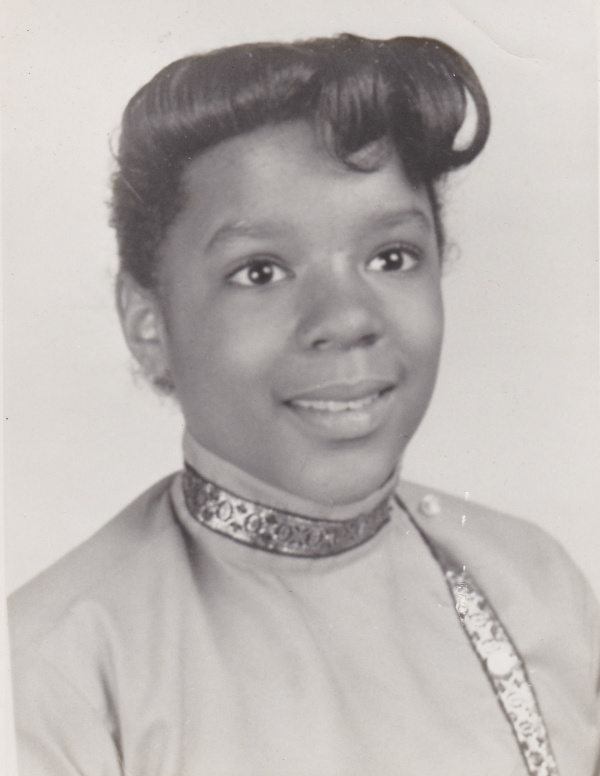 childhood picture During Candy’s formative years her uncle received a call to ministry and started a new congregation, New Image Baptist Church in southeast Washington, DC.. Candy’s parents and other relatives all became active in this congregation. Candy was the first child baptized there, when she was eight years old. Candy grew up in that church—ushering, singing in the choir, teaching other children. Her parents were prominent leaders in the congregation, so Candy was viewed as a Deacon’s kid. Seeing dysfunctions that happened behind the scenes in church led Candy to become disenchanted with the church life. Her interest in church was waning by the time she was in high school.
childhood picture During Candy’s formative years her uncle received a call to ministry and started a new congregation, New Image Baptist Church in southeast Washington, DC.. Candy’s parents and other relatives all became active in this congregation. Candy was the first child baptized there, when she was eight years old. Candy grew up in that church—ushering, singing in the choir, teaching other children. Her parents were prominent leaders in the congregation, so Candy was viewed as a Deacon’s kid. Seeing dysfunctions that happened behind the scenes in church led Candy to become disenchanted with the church life. Her interest in church was waning by the time she was in high school.
Candy was active in athletics in school and competed in track and field and basketball. She was also musically gifted and sang in a number of different choirs and ensembles, ranging from classical to Gospel. She sang with the prestigious, citywide D.C. Youth Chorale, which traveled nationally and internationally. She joined the gospel choir at McKinley Technical High School because she was initially interested in the young man who played the piano. This choir sang in different churches in the metro area, giving Candy the opportunity to observe different religious expressions. The piano player was Seventh Day Apostolic and she enjoyed visiting his church.
Candy’s parents supported her musical activities, making personal sacrifices so that she could have piano lessons, dance lessons and other training. They enrolled her in the Art Linkletter School of the Arts who provided training for young women in social graces and skills and the arts.
Candy was aware that she had an affinity for women since she was 11 (junior high school) but didn’t know exactly what that meant. In the turbulent 1970s, her musical activities provided Candy with a diversity of experiences that cut across racial and religious boundaries. Her parents grew increasingly concerned about her interest in other religious experiences. They sat her down to insist that her religious practice would continue in the family Baptist church as long as she lived i. Their home. Candy realized she was a spiritual seeker so she had to secretly explore other religious experiences.
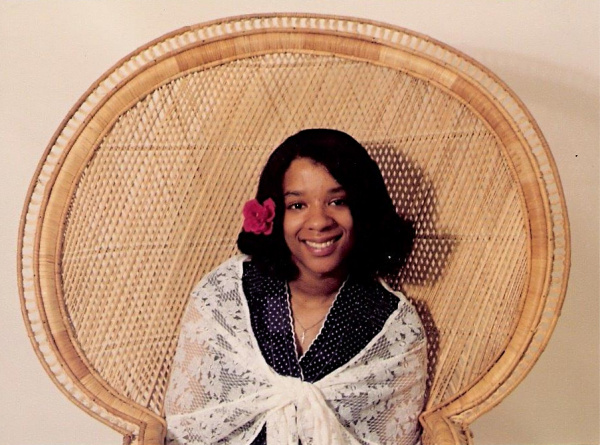 Young adult in 1982 A turning point Candy remembers vividly during a high school choir engagement at Antioch Baptist Church in D.C., she recalls being enveloped and embraced physically by the presence of the Holy Spirit during an altar call and prayers. She literally felt on fire. It was the most intense feeling of love she had ever experienced. She then felt a tap on the shoulder—her father had arrived to take her home. Though disappointed to have that experience eclipsed, she found that she was able to relive this experience through prayer -- the presence of the Spirit would return to her hands and the crown of her head. This experience led her to study more about the gifts of the Spirit. She began to realize that this was a gift of healing that God was bestowing upon her. She could not talk to her parents about this.
Young adult in 1982 A turning point Candy remembers vividly during a high school choir engagement at Antioch Baptist Church in D.C., she recalls being enveloped and embraced physically by the presence of the Holy Spirit during an altar call and prayers. She literally felt on fire. It was the most intense feeling of love she had ever experienced. She then felt a tap on the shoulder—her father had arrived to take her home. Though disappointed to have that experience eclipsed, she found that she was able to relive this experience through prayer -- the presence of the Spirit would return to her hands and the crown of her head. This experience led her to study more about the gifts of the Spirit. She began to realize that this was a gift of healing that God was bestowing upon her. She could not talk to her parents about this.
As she was completing high school Candy started thinking of becoming a doctor, to use her gifts of healing. She received an academic scholarship to study at Wheaton College in Norton, Mass., about 40 miles from Boston. Enrolling in all-women’s school that was predominately White was a huge culture shock from life in D.C. where she interacted mostly with Black persons. The school had 1,200 students of whom around 40 were persons of color. She quickly tried to identify other students with whom she could connect. Though painfully shy,Candy made friends with a group of 6-7 Black women who participated in a new church in Boston. In addition to the culture shock, Candy’s counselor had encouraged her to enroll in upper-level classes because of outstanding academic work in high school. This meant that her first two years there were very difficult academically.
In the midst of this personal tumult, the church in Boston, Church of Our Lord Jesus Christ of the Apostolic faith, became a comfortable and safe place. As Candy immersed herself in that faith community she discovered there were many rules and limitations for living, largely related to wardrobe and social interactions. She didn’t have money to buy new clothes, so borrowed clothes from friends. She also had to be rebaptized in the Apostolic tradition - in the name of Jesus. She was expected to “tarry” for the Holy Ghost, to weekly pray with others to invite the presence of the Holy Spirit. This took the form of chanting, calling on Jesus’ name again and again. The expectation was evidence of the indwelling Spirit would eventually be demonstrated with speaking in tongues. It took months for Candy to get recieve tje Holu Ghost and this glossalalia experience.
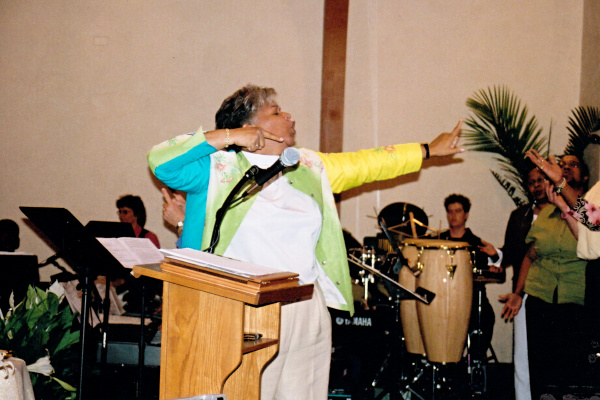 Leading mass choir at MCC Conference of People of African Descent 2005 The Apostolic tradition was more orthodox and stricter than other black Pentecostal traditions, particularly related to gender roles. Im the Apostolic tradotion, women could not preach or teach. Women sat behind the men in church. Women were to marry and have children. The man was head of the household. Women were expected to date only men for short stints. Premarital sex, dancing, worldly music, playing cards, make up, jewelry, and movies were all off- limits so this severely limited the life opportunities for college students like Candy.
Leading mass choir at MCC Conference of People of African Descent 2005 The Apostolic tradition was more orthodox and stricter than other black Pentecostal traditions, particularly related to gender roles. Im the Apostolic tradotion, women could not preach or teach. Women sat behind the men in church. Women were to marry and have children. The man was head of the household. Women were expected to date only men for short stints. Premarital sex, dancing, worldly music, playing cards, make up, jewelry, and movies were all off- limits so this severely limited the life opportunities for college students like Candy.
Back in Washington, D.C. Candy’s mother was becoming quite ill with diabetes. She could no longer work outside the home, which put pressure on the family finances. Candy asked her parents if she should come home to help out. While they didn’t ask her to come, she felt it was her duty as the oldest daughter. So Candy left college after her second year and went back to D.C. to help out with the family. She got a job in the federal government and resumed college.
She became active in an Apostolic Church in D.C - Newborn Church of God and True Holiness which was even more strict that the church in Boston. In addition to the dogma of the previous church tradition, this church's dogma expected members to keep a distance from family members who were not also “saved.” This led to strains in the family. Candy, always a passionate person, became a zealot in the faith, making life with her family even more challenging. She continually admonished other family members to “get saved” and to join her in the Apostolic church. Her family remained in the Baptist church.
Through these years Candy seriously dated and was engaged to a number of men from the Apostolic tradition. She also had a strong affection for a woman in the Boston and DC church. This emotional attachment to a woman seemed “natural” for her and was not new. In D.C. a woman in the church who was a few years older became Candy’s friend and mentor. That emotional attachment deepened over time. Even though Candy had become indoctrinated in the Apostolic tradition, there remained an underlying conflict between the affirmations of her gifts and the values Candy received from her mother and the strict practice of the church to put women in subservient roles. So Candy started asking questions about that.
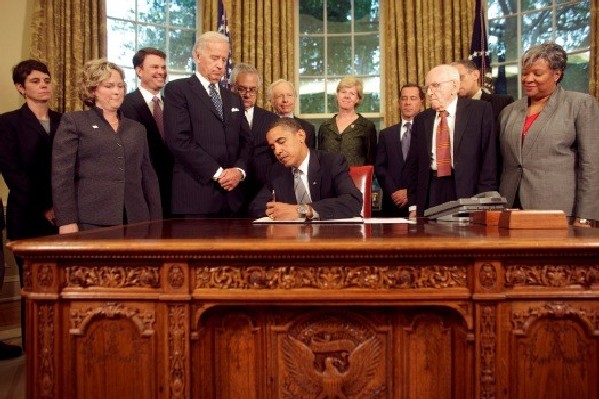 At signing of executive order in White House Candy sang with the choir in the D.C. church and as her gifts emerged she became the choir director. The choir grew under her leadership. She found that singing melded her musical gifts with her spiritual gifts. It was when she was singing that she experienced the Holy Spirit coming down upon the congregation and bringing healing.
At signing of executive order in White House Candy sang with the choir in the D.C. church and as her gifts emerged she became the choir director. The choir grew under her leadership. She found that singing melded her musical gifts with her spiritual gifts. It was when she was singing that she experienced the Holy Spirit coming down upon the congregation and bringing healing.
It was also during this time that Candy started hearing preaching condemning homosexuality. She never imagined that it might apply to her, but thought it might be directed toward the piano player who was married, but had effeminate mannerisms.
As her affinity with her friend and mentor grew even stronger, Candy was called into a meeting with all the church women from the church who “undressed” her to try to pressure and ostracize her. She was told that she was possessed with the devil, evil spirits, and needed exorcism. She was pressured to get married in order to overcome her unnatural inclinations.
Candy was mystified and hurt by this talk. She couldn’t figure out what was “unnatural” about what who she was and how she was she…this was the way she had always been. She could not understand why the other church women were turning on her and tried to continue as best she coulid. But it was hard. The level of tension only increased. A national convocation of churches and choirs was happening in New York City. Candy had prepared her choir to sing there and travelled there. After arriving a group of church and choir leaders, some of whom were driends, intercepted her as she approached the venue to tell her that she was “unfaithful” and would not be directing the choir. Candy tried appealing to the bishop, but to no avail.
 With President Barack Obama Candy cried her heart out in the bathroom, and then went into the sanctuary and sat in the audience. The choir was not aware what was happening. Ironically, the woman who was Candy’s friend and mentor and with whom she had an affinity stood in as choir director in her place. She had bowed down to the pressure and expectations.
With President Barack Obama Candy cried her heart out in the bathroom, and then went into the sanctuary and sat in the audience. The choir was not aware what was happening. Ironically, the woman who was Candy’s friend and mentor and with whom she had an affinity stood in as choir director in her place. She had bowed down to the pressure and expectations.
Candy entered a very difficult period of her life. As she tried to discern what was happening with her sexuality, she began to push religion and spirituality out of her life. She got to know a lesbian who was from the Apostolic tradition. However Candy had been so totally immersed in the tradition that she could not divest herself of the understanding that as a lesbian she would go to hell. How could God allow this to happen to her? She ended up being estranged from church and God for seven years. During this time she tried going to interfaith places where she would not find God’s judgement. She had to hit bottom in order to rebuild her heart, her life and her spirit. As she came to terms that she was a lesbian, she could not integrate spirituality with that.
In the late 1980s, Candy was part of a Black Lesbian Support Group in DC. Another woman there ( who would later become her best friend), learned of Candy’s musical background and invited her to come to her church which was seeking gospel choir members. It took Candy quite a while to get up the nerve to go. The congregation met in a house. For her first visit, she noted it was crowded with predominately white men, a few women and persons of color. However, Pastor Larry Uhrig’s sermon touched her heart deeply. Service after service, she was watched with amazement the deeply spiritual intimacy of Communion. She continued attending periodically and cried through the whole service each time. This Metropolitan Community Church of DC congregation slowly wooed her back into a life of faith and brought healing to her life. It was a while longer before she was able to bring her gifts of music. When the need emerged for a gospel choir director. And there she was again, agreeing to help out. Slowly, Candy began to learn that her spirituality and sexuality were intertwined and were indeed gifts of God.
Candy proceeded to rebuild her life bit by bit. She entered her first real and somewhat out Lesbian relationship. She could not tell her family about her relationship and did not take her partner to the family home.
Candy’s mother was becoming increasingly ill and asked questions trying to understand what was happening in Candy’s life—even encouraging her to “live her life.” Candy was still too scared to come out. Her mother died during the period when this first relationship broke up—her heart was broken in two ways. Candy’s father was in fairly good health, but getting older and still needed care, so she became his caretaker.
Throughout this time Candy was thriving professionally in her work in the federal government, at the Government Accounting Offfice (GAO). She moved up in the management ranks. But she did not come out at work. Always careful to not talk about her personal life at work.
The gospel choir at MCC-DC grew tremendously under Candy’s leadership. The choir was invited to sing at major public engagements: Human Rights Campaign Fund dinner, Washtington Vathedral, National March on Washington, as backup to national performers. Candy was finding healing through music and, in turn, discerned that she had gifts for healing ministry. As she pondered how to respond to this call to ministry, she decided to pursue vocational training in an interfaith setting—at The New Seminary for Interfaith Studies in New York. She became certified and ordained as an Interfaith Minister there in 2001. As her ministry developed and expanded she was ordained in MCC in 2008. She also received her M.Div. degree from Episcopal Divinity School, Cambridge, Massachissetts, in 2011.
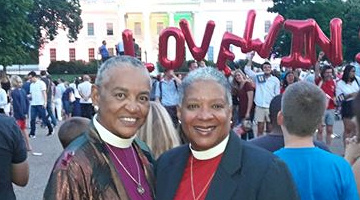 With Darlene at 2015 rally following Supreme Court marriage decision. Even with her growing ministry in MCC, Candy kept that separated from her professional life. Then Proposition 8 which eliminated the right of same-sex couples to marry passed in California in 2008. While Candy had never planned to get married because she thought she couldn't, this campaign pierced her heart. Not long thereafter it was Diversity Month at the GAO and the LGBTQI employees group decided to post pictures of their families in a photo display in the lobby to showcase our families. Candy talked with her partner, Rev Elder Darlene Garner, who agreed to have their photo displayed. When Candy first walked by the assembled display she saw their picture had been enlarged on a large scale and placed in the center of the display, surrounded by smaller pictures of white families. Candy felt a sense of pride for this witness.
With Darlene at 2015 rally following Supreme Court marriage decision. Even with her growing ministry in MCC, Candy kept that separated from her professional life. Then Proposition 8 which eliminated the right of same-sex couples to marry passed in California in 2008. While Candy had never planned to get married because she thought she couldn't, this campaign pierced her heart. Not long thereafter it was Diversity Month at the GAO and the LGBTQI employees group decided to post pictures of their families in a photo display in the lobby to showcase our families. Candy talked with her partner, Rev Elder Darlene Garner, who agreed to have their photo displayed. When Candy first walked by the assembled display she saw their picture had been enlarged on a large scale and placed in the center of the display, surrounded by smaller pictures of white families. Candy felt a sense of pride for this witness.
Almost immediately thereafter. she received a call at her office desk for “Rev. Holmes.” Wondering who would address her this way at work, she learned the call was from the White House. Where she was being invited to stand with President Obama as he signed the Presidential Memorandum granting federal benefits to same-sex domestic partners of federal employees in 2009. Because of policies restricting employees of other federal departments from visiting the White House, she had to go through numerous procedures to get permission to do this. At the signing ceremony, the President took the time for conversations with each person present. Upon her turn Candy thanked the President for all he had done to support LGBTQ people and surprised herself by adding that there was more for him to do. She held his hand, looked sqarely in his eyes and asked for his help. He said he would and encouraged her to go back to her community and ask them to make him do support the LGBTQI community. And that is what Candy did.
Candy had unexpectedly and perhaps reluctantly, moved into the role of public advocate. Gollowing on there would be ongoing requests. She was asked to give testimony on behalf of the Domestic Partnership Benefits and Obligations Act to the House of Representatives Subcommittee on Federal Workforce, Postal Service and District of Columbia in July 2009. She became a spokesperson on behalf of marriage equality with the Human Rights Campaign. When the Civil Marriage Protection Act came before the Maryland state legislation in 2012 she testified in both the state Senate and House of Representatives. This legislative was defeated at the polls the first time. Candy and others noted that the campaign had not drawn upon faith leaders more openly and more broadly. When the proposed law was brought forward a second time, the campaign did put more faith leaders, allies and persons of color into the public spotlight—and it passed.
Candy and her wife Rev Darlene were also part of the justice work for marriage equality in Washington DC. And were one of the first five couples and the first black clergy, same-gender couple to be married in Washington DC.
(This biographical statement written by Mark Bowman from an interview with Candy Holmes and edited by Candy.)
Biography Date: September 2017